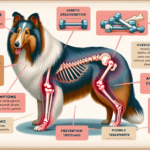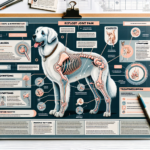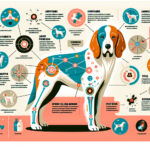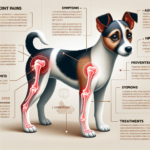Collie Joint Pain: Causes, Symptoms, Prevention, and Treatment

Introduction
Collies, known for their intelligence, agility, and striking appearance, have a rich history that dates back to the Scottish Highlands. Originally bred for herding sheep, Collies are renowned for their loyalty, work ethic, and gentle demeanor. The breed is divided into two main types: the Rough Collie, with its long, luxurious coat, and the Smooth Collie, which has a shorter, dense coat. Both types share similar characteristics and health concerns.
Like many purebred dogs, Collies are prone to certain health issues. Among these, joint pain is a significant concern that can affect their quality of life. Joint health is particularly crucial for Collies due to their active nature and the physical demands of their traditional roles as herding dogs.
Breed-Specific Joint Pain Risks
Genetic Predisposition
Collies are genetically predisposed to several joint-related issues, including hip dysplasia, arthritis, and elbow dysplasia. Hip dysplasia, a condition where the hip joint doesn’t fit properly into the hip socket, is particularly common. This genetic disorder can lead to arthritis and chronic pain if not managed properly. Elbow dysplasia, another hereditary condition, involves abnormal development of the elbow joint, leading to pain and lameness.
Age-Related Risks
As Collies age, the risk of developing joint pain increases. Senior Collies are more susceptible to arthritis, a degenerative joint disease that causes inflammation and pain. Typically, signs of arthritis may begin to appear in Collies around the age of seven or eight, although this can vary depending on the individual dog’s health and lifestyle.
Activity Level and Joint Stress
Collies are known for their high energy levels and need for regular exercise. While their active lifestyle is beneficial for overall health, it can also contribute to joint stress. Activities such as running, jumping, and herding can put significant strain on their joints, potentially leading to wear and tear over time. It’s essential to balance their activity levels to prevent overexertion and joint damage.
Common Symptoms of Joint Pain in Collies
General Symptoms
- Limping: One of the most noticeable signs of joint pain is limping or favoring one leg over another.
- Stiffness: Collies may show stiffness, especially after resting or during cold weather.
- Reluctance to Move: A dog in pain may be hesitant to engage in activities they once enjoyed, such as running or climbing stairs.
- Swelling: Inflammation around the joints can cause visible swelling.
- Behavioral Changes: Irritability or changes in behavior can indicate discomfort or pain.
Breed-Specific Symptoms
In Collies, joint pain may manifest in specific ways due to their unique build and activity patterns. For instance, they might show a noticeable decrease in their herding instincts or agility. Additionally, their expressive eyes and facial expressions can sometimes reveal discomfort that might not be as apparent in other breeds.
When to Consult a Vet
If you notice any of the above symptoms in your Collie, it’s crucial to consult a veterinarian promptly. Early intervention can prevent further deterioration and improve your dog’s quality of life. Persistent limping, severe stiffness, or any sudden changes in behavior should be addressed immediately.
Preventive Measures for Joint Health
Exercise Recommendations
Regular, moderate exercise is essential for maintaining joint health in Collies. Activities such as walking, swimming, and controlled play can help keep their joints flexible and muscles strong without causing excessive strain. Avoid high-impact activities like jumping or running on hard surfaces, which can exacerbate joint issues.
Dietary Suggestions
A balanced diet rich in essential nutrients can support joint health. Consider incorporating foods or supplements that contain glucosamine, chondroitin, and omega-3 fatty acids, which are known to promote joint health and reduce inflammation. Consult your veterinarian for specific dietary recommendations tailored to your Collie’s needs.
Weight Management
Maintaining a healthy weight is crucial for reducing joint stress. Excess weight can put additional pressure on the joints, exacerbating pain and discomfort. Monitor your Collie’s weight regularly and adjust their diet and exercise routine as needed to keep them at an optimal weight.
Early Screening and Monitoring
Regular veterinary check-ups are essential for early detection of joint issues. Screening tests such as X-rays or joint fluid analysis can help identify problems before they become severe. Early intervention can significantly improve outcomes and prevent long-term damage.
Treatment Options for Joint Pain
Non-Surgical Treatments
Non-surgical treatments for joint pain in Collies include medications, physical therapy, and lifestyle adjustments. Anti-inflammatory drugs and pain relievers can help manage symptoms, while physical therapy can improve mobility and strengthen muscles. Lifestyle changes such as providing a comfortable bed and avoiding strenuous activities can also alleviate pain.
Surgical Options
In severe cases, surgical intervention may be necessary. Common surgeries for joint pain include hip replacement, arthroscopy, and joint fusion. These procedures can provide significant relief and improve mobility, but they come with risks and require a thorough discussion with your veterinarian.
Alternative Therapies
Alternative treatments such as acupuncture, hydrotherapy, and massage can also benefit Collies with joint pain. Acupuncture can help reduce pain and inflammation, while hydrotherapy provides low-impact exercise that strengthens muscles without stressing the joints. Massage therapy can improve circulation and alleviate muscle tension.
Lifestyle and Management Tips
Daily Care Routine
A consistent daily care routine can help manage joint pain in Collies. This routine might include gentle exercise, a balanced diet, and regular grooming to keep their coat and skin healthy. Providing a comfortable resting area with orthopedic beds can also make a significant difference in their comfort levels.
Modifying the Home Environment
Making small changes to your home environment can greatly benefit a Collie with joint pain. Consider installing ramps to help them navigate stairs or get into vehicles. Ensure their resting areas are easily accessible and provide supportive bedding to reduce pressure on their joints.
Long-Term Management
Long-term management of joint pain involves regular veterinary check-ups, ongoing monitoring of symptoms, and adjustments to their care routine as needed. Keeping your Collie active and engaged with low-impact activities can help maintain their physical and mental well-being.
FAQs About Collies and Joint Pain
What are the early signs of joint pain in Collies?
Early signs include limping, stiffness, reluctance to move, and behavioral changes such as irritability or decreased interest in activities.
Can joint pain in Collies be prevented?
While genetic predispositions cannot be entirely prevented, maintaining a healthy weight, providing regular exercise, and ensuring a balanced diet can significantly reduce the risk of joint pain.
Are there specific exercises that are better for Collies with joint pain?
Yes, low-impact exercises such as swimming and walking on soft surfaces are ideal for Collies with joint pain. These activities help maintain mobility without putting excessive strain on their joints.
What dietary supplements can help with joint health in Collies?
Supplements containing glucosamine, chondroitin, and omega-3 fatty acids are beneficial for joint health. Always consult your veterinarian before adding any supplements to your dog’s diet.
When should I consider surgery for my Collie’s joint pain?
Surgery should be considered when non-surgical treatments are no longer effective, and your Collie’s quality of life is significantly impacted. Consult your veterinarian to discuss the best options for your dog.
Conclusion
Joint pain is a common issue in Collies, but with proper care and attention, it can be managed effectively. By understanding the causes, symptoms, and preventive measures, you can help ensure your Collie remains active and comfortable throughout their life. Regular veterinary check-ups, a balanced diet, and appropriate exercise are key to maintaining joint health. If you notice any signs of joint pain, consult your veterinarian promptly to explore the best treatment options for your beloved pet.




